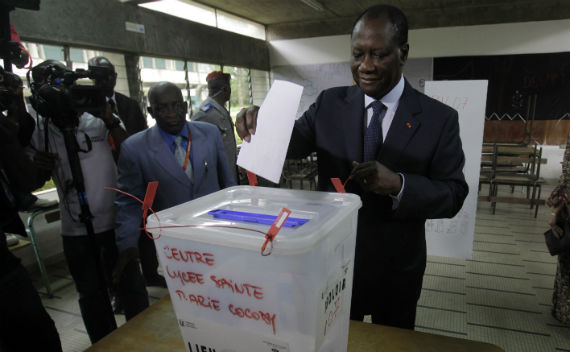Ivory Coast Off the International Radar Screen – Prematurely?
More on:

Abidjan and other Ivorian urban centers appear to be recovering nicely from the civil war between the followers of Laurent Gbagbo and Alassane Ouattara earlier in the year. On December 11, the country held its first legislative elections since 2000 under secure conditions. On December 16, the electoral commission announced that Ouattara’s party, Rally of the Republicans (RDR) won 127 of the 255 seats, with its ally, the Ivory Coast Democratic Party (PDCI) getting seventy-seven.
So things are looking good?
Perhaps, but there are negatives.
Even if there is no fighting, the country seems as deeply divided as ever. Laurent Gbagbo’s Ivorian Popular Front (FPI) boycotted the elections because, it said, of security concerns and the continued detention of Gbagbo by the International Criminal Court at the Hague. Voter turnout was 36.56 percent, down from the 2010 presidential election when more than 80 percent voted and both Gbagbo and Ouattara were on the ballot.
The International Crisis Group, a highly respected NGO, has just issued an important brief: Cote d’Ivoire: Continuing the Recovery. It warns that the country remains deeply divided. It cites slow progress toward the reconciliation and amalgamation into a new Ivorian army of Ouattara’s and Gbagbo’s former militias. It also cites a justice system that is biased. Thus far, none of Ouattara’s supporters has been prosecuted. It also notes that Gbagbo’s supporters see his transfer to the International Criminal Court as a barrier to reconciliation. The ICG urges Ouattara and his government to make concessions to the opposition so that it will return to political life before the 2012 regional and local elections.
The consequences of the transfer of Gbagbo to the ICC are complex. On the one hand, surely the possibility that heads of state may be answerable for their crimes at the Hague advances the cause of accountability and perhaps of good governance. But, in a deeply divided country where atrocities were committed by both sides, the fact that none of Ouattara’s people are at the Hague does, indeed, damage the prospects for reconciliation.
More on:
 Online Store
Online Store